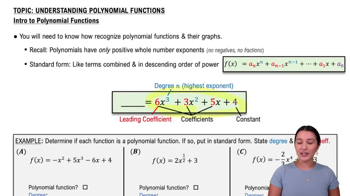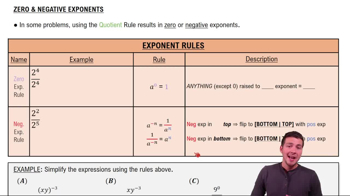Here are the essential concepts you must grasp in order to answer the question correctly.
Limits at Infinity
Limits at infinity refer to the behavior of a function as the input approaches infinity. This concept is crucial in calculus for understanding how functions behave in extreme cases, particularly for rational functions, polynomials, and exponential functions. Evaluating limits at infinity helps determine horizontal asymptotes and the end behavior of functions.
Recommended video:
Polynomial Functions
Polynomial functions are expressions that involve variables raised to whole number powers, combined using addition, subtraction, and multiplication. The degree of the polynomial significantly influences its behavior as x approaches infinity. For example, in the limit of x^−6, the polynomial's degree indicates that as x increases, the value of the function approaches zero.
Recommended video:
Introduction to Polynomial Functions
Negative Exponents
Negative exponents indicate the reciprocal of the base raised to the corresponding positive exponent. For instance, x^−6 can be rewritten as 1/x^6. This transformation is essential for evaluating limits, as it clarifies how the function behaves as x approaches infinity, leading to the conclusion that the limit approaches zero.
Recommended video:






